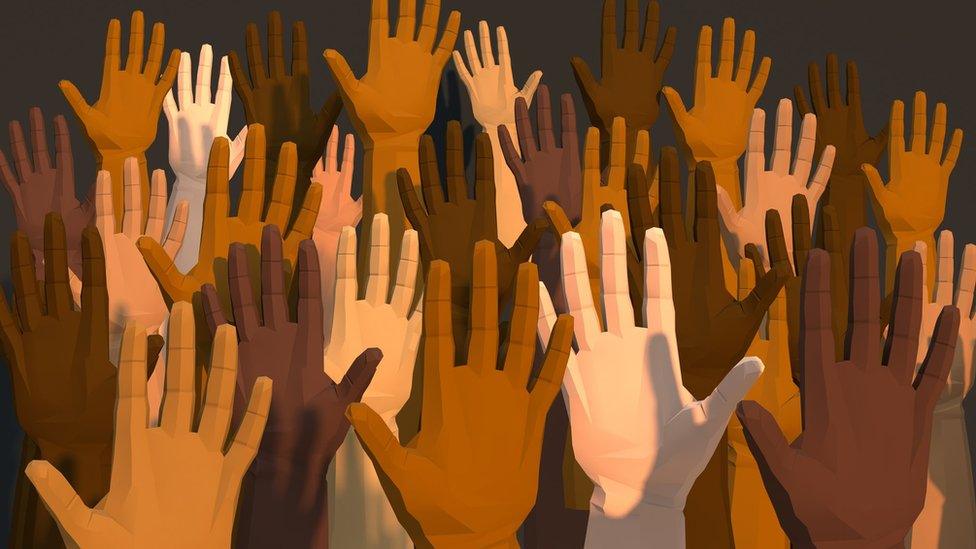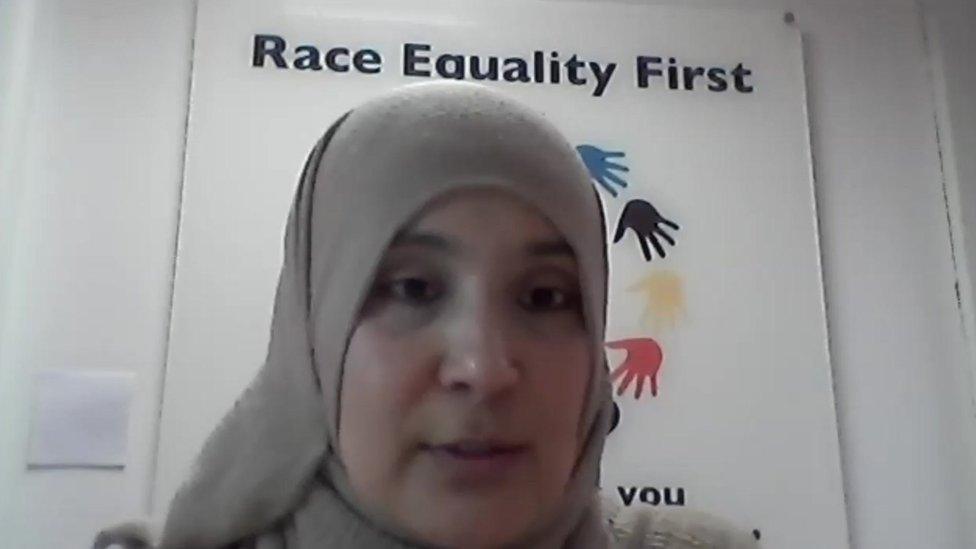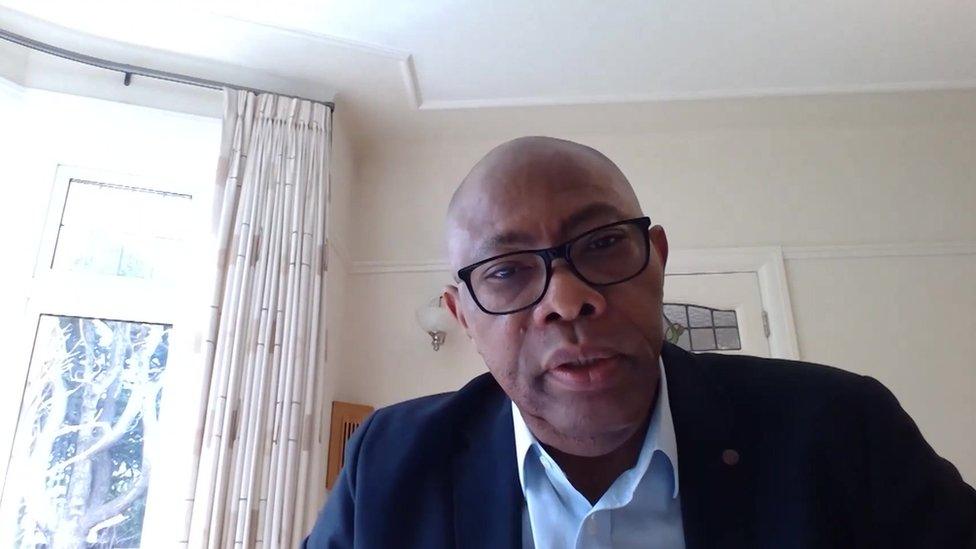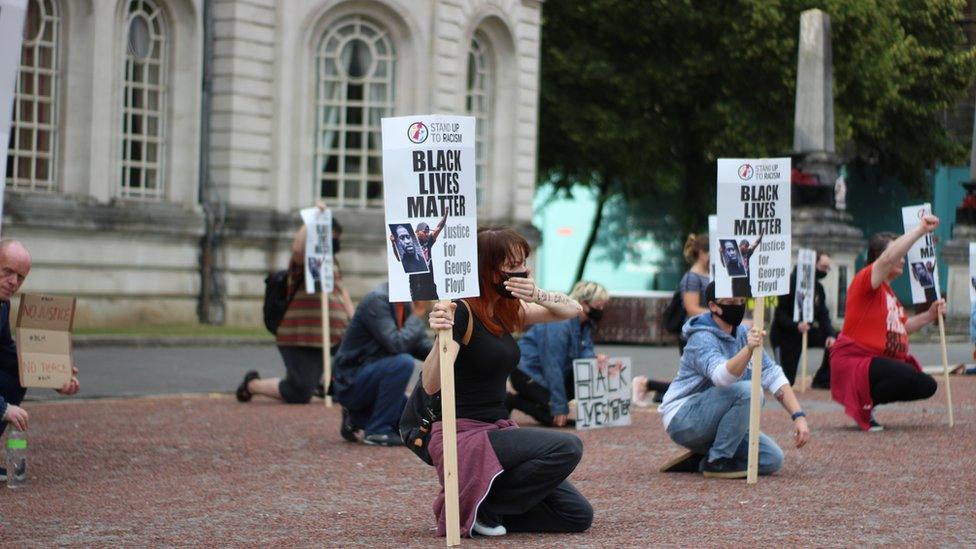BAME: 'Governments failed to tackle racial discrimination'
- Published

Existing laws have failed to tackle racial discrimination, Prof Emmanuel Ogbonna says
Successive governments have failed to tackle racial discrimination in Wales, according to a leading expert.
Prof Emmanuel Ogbonna said laws designed to protect people simply have not been implemented and he was now involved in developing a Race Equality Action Plan for the Welsh government.
It comes as one charity has seen an increase in people seeking support for race discrimination and hate crimes.
Deputy minister Jane Hutt acknowledged action to date had not been enough.
Race Equality First said it was compiling a report to the UN, examining Wales' progress in eliminating racial discrimination.

Roon Adam from the charity Race Equality First said "the problem just isn't being solved"
Roon Adam, from the charity, said the death of George Floyd in America last year changed things, prompting others to raise problems and have their voices heard.
"These communities have been in Wales for 50, 60, or 100 years," she said.
"The problems they are facing now more or less existed then. It's a different generation now but it's the same problem and it's not being solved."

Prof Ogbonna, who is an academic at Cardiff University, in a recent report for the Welsh government looking at Covid's impact on black, Asian and minority ethnic (BAME) communities, found systemic institutional racism may have played a role.
"The challenge ahead is huge," he said. "Successive governments have not taken any action on race."
But he argued any future action plan needed to be underpinned in law - although he acknowledged existing laws had failed to make the change required.
"People continue to suffer racial and ethnic discrimination - the reason being that organisations and institutions have simply failed to implement the laws - and nobody's asked questions. Nobody's asked why," he said.
"As part of this action plan, we plan to hold institutions and the Welsh government to account."
Ms Adam said: "Wales still has a long way to go."
She explained Race Equality First has worked in this field in Wales for 45 years.

Roon Adam said the death of George Floyd in America last year changed things, prompting others to raise problems
From racist bullying being "an everyday reality for BAME children", to healthcare, housing, employment and racial profiling, "you name it, we deal with it all".
She said the issues affect all areas of people's lives, leaving many feeling isolated, humiliated or even suicidal.
"Last year we had nearly 200 cases, but the number of enquiries is far greater," she said.
"In many cases people don't take it forward - they don't have trust in the justice system, they feel there's no point."
She said over the last year they'd seen a big increase in the number of calls for support, as well as anti-discrimination and racism training for organisations.
"A lot of people and organizations understood that it is not enough to simply 'not be racist' but that you have to be 'actively anti racist'," she added.
Racist slurs from neighbour
One person who agrees that more need to be done said she often receives racist abuse.
Zoe - not her real name - has had problems with her neighbour for more than three years, involving attacks on her property and racist slurs.
It has now reached the point where Zoe can only make certain phone calls from her stairs, as she is aware the neighbour listens in.
She said that she does not feel safe living in her home because of this.
She said: "I feel scared that she's unpredictable, but the people she invites to the house could also cause me harm as well, because of the drinking involved.
"It's caused lots of sleepless nights. It's caused fear in case she comes into my garden - she previously tried to break down my door."
Her neighbour was given a suspended sentence, curfew and restraining order, but attempts to have her evicted have so far failed.
"It feels like her needs are being put before mine," said Zoe.
Jane Hutt, deputy minister and chief whip, said: "We've recognised that there is structural inequality in the way we plan and deliver our policies and services - institutional racism results from that.
"It's crucial we get this [action plan] right and that we're held to account.
"It's about a fundamental change of behaviour and the way we plan and prioritise our services, and that includes budgets. It means everything should go through the lens of 'what is this going to do to tackle racial disparities?'"
She added that as well as putting a responsibility on all levels of government, private, public and third sector, political parties must also change and show better diversity.
"This is not going to happen overnight, but I think there is a commitment there that this is one of the most important things for Wales going forward," she said.
"We want to be an anti-racist Wales."
'Work together'
Jane Dodds, leader of the Welsh Liberal Democrats, said: "There is no place in Wales for discrimination of any type and whilst progress has been made, more needs to be done.
"Everyone in society needs to work together to address and eliminate the discrimination which exists in Wales. Everyone from the government down has a role to play in this."
Plaid Cymru's shadow minister for equalities, Leanne Wood, said: "Systematic and systemic racism in Wales has long been rife, and it has been made clearer than ever during Covid through its disproportionate effects on BAME communities.
"The report from Welsh government's advisory group emphasising such issues should have been a final wake up call for the Welsh government to take urgent and immediate action to tackle the long standing inequalities that exist in Wales.
"Plaid called last summer for a full and thorough investigation into systemic racism in Wales with concrete recommendations to be honoured, and lead various debates in the Senedd calling for the mandatory inclusion of the history of black people and people of colour in the new curriculum to inform pupils and set a precedent for a modern, forward thinking country free of prejudice.
"Plaid Cymru is also advocating for Wales to have its own justice system in order to tackle the inequalities that exist within it, including the disproportionate imprisonment rates among BAME communities."
A Welsh Conservative spokesperson said: "We're not surprised to find that the Welsh government's duties and responsibilities with reference to anti-discrimination policies haven't been properly implemented; they join a long litany of other areas where this Labour government has let down the very people it serves.
"However, we are pleased to learn that Professor Emmanuel Ogbonna is working on the Race Equality Action Plan, and look forward to future discussions with him about how to tackle the sadly still-existing problem of racism and racial discrimination in Wales, which are completely unacceptable to - thankfully - the vast majority of people living in a modern, dynamic, and diverse United Kingdom."
- Published4 February 2021

- Published19 March 2021

- Published21 June 2020
